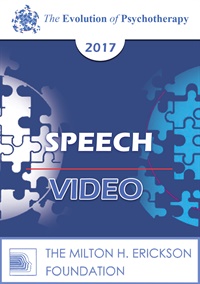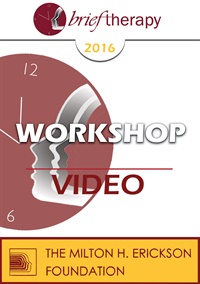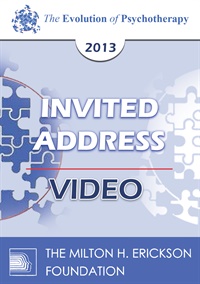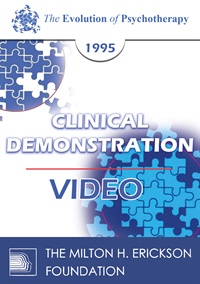
- Average Rating:
- Not yet rated
- Topic Areas:
- Utilization | Clinical Demonstrations | Psychotherapy | Therapist Development | Children and Adolescent Therapy | Interviewing | Relationships | Therapeutic Relationship
- Bundle(s):
- Art of Psychotherapy - Utilization Series
- Categories:
- Art of Psychotherapy
- Faculty:
- Jeffrey Zeig, PhD
- Course Levels:
- Master Degree or Higher in Health-Related Field
- Duration:
- 2 Hours 18 Minutes
- Format:
- Audio and Video
- Original Program Date:
- Jun 28, 2020
- Short Description:
- Demonstration subject Mette is struggling with issues trying to feel an emotional connection to her children. She describes her difficulty with being present for her children, and is looking for guidance. Dr. Zeig exhibits a few simple techniques that help create a powerful therapeutic relationship quickly, through the use of gestures and strategic interview questions. Dr. Zeig is able to utilize this information to create useful suggestions to help Mette with her situation.
- Price:
- $79.00 - Base Price
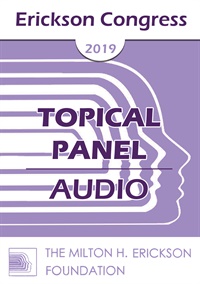
- Average Rating:
- Not yet rated
- Topic Areas:
- Workshops | Dialectic Behavior Therapy (DBT) | Interviewing | Motivation | Cancer | Depression | Resistance
- Categories:
- Erickson Congress | Erickson Congress 2019
- Faculty:
- Neil Fiore, PhD
- Duration:
- 1 Hour 54 Minutes
- Format:
- Audio Only
- Original Program Date:
- Dec 12, 2019
- Short Description:
- Training cancer patients in Stress Management and Dialectic Behavior Therapy methods to challenge worries, ineffective self-management, and ambivalence, using Motivational Interviewing:
- Price:
- $15.00 - Base Price
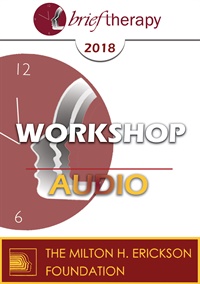
- Average Rating:
- Not yet rated
- Topic Areas:
- Workshops | Brief Therapy | Interviewing | Solution Oriented Approach
- Categories:
- Brief Therapy Conference | Brief Therapy Conference 2018
- Faculty:
- Elliott Connie, MA, LPC
- Duration:
- 1:13:19
- Format:
- Audio Only
- Original Program Date:
- Dec 07, 2018
- Short Description:
- Since the Solution Focused Approach is a questions based process, it is essential that clinicians learn the art of asking the kinds of questions that lead towards sustainable questions in their clients' lives. This means your learning has to go beyond theory and technique, instead being about language. This workshop will be about this question process. The facilitator will demonstrate 5 different categories of SFBT questions showing how to ask such questions in a way that leads towards the kind of client responses that are likely to lead towards change.
- Price:
- $15.00 - Base Price
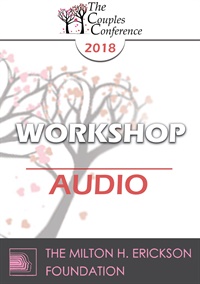
- Average Rating:
- Not yet rated
- Topic Areas:
- Sex and Sexuality | Attachment | Workshops | Couples Therapy | Interviewing | Neurobiology
- Categories:
- Couples Conference | Couples Conference 2018 | Pioneers in Couples and Family Therapy
- Faculty:
- Stan Tatkin, PsyD, MFT
- Duration:
- 1:59:07
- Format:
- Audio Only
- Original Program Date:
- May 04, 2018
- Short Description:
- This workshop explores sex as a core issue in couple therapy, emphasizing psychobiological and attachment-based frameworks. Tatkin presents bottom-up interviewing and assessment techniques that address implicit somatic responses, performance anxiety, and intimacy challenges. Clinicians learn to integrate neurobiology, arousal regulation, and attachment style into practical interventions for treating sexual dissatisfaction and dysfunction.
- Price:
- $15.00 - Base Price
Credit available - Click Here for more information
- Average Rating:
- Not yet rated
- Topic Areas:
- Speeches | Interviewing | Motivation | Therapeutic Relationship
- Categories:
- Evolution of Psychotherapy | Evolution of Psychotherapy 2017 | Online Continuing Education
- Faculty:
- William Miller, PhD
- Course Levels:
- Master Degree or Higher in Health-Related Field
- Duration:
- 55:47
- Format:
- Audio and Video
- Original Program Date:
- Dec 15, 2017
- Short Description:
- The clinical method of motivational interviewing (MI) evolved from the person-centered approach of Carl Rogers, maintaining his pioneering commitment to the scientific study of therapeutic processes and outcomes. The original developer of MI will summarize the development of this method, its linkage to Rogers, and research on its therapeutic processes, outcomes, and training.
- Price:
-
Sale is $29.00
price reduced from Base Price - $59.00

- Average Rating:
- Not yet rated
- Topic Areas:
- Topical Panels | Interviewing | Therapist Development
- Categories:
- Evolution of Psychotherapy | Evolution of Psychotherapy 2017
- Faculty:
- Otto Kernberg, MD | William Miller, PhD | Michael Yapko, PhD
- Duration:
- 1:01:10
- Format:
- Audio Only
- Original Program Date:
- Dec 15, 2017
- Short Description:
- The structure of initial interview from three different approaches will be described and discussed.
- Price:
- $15.00 - Base Price

- Average Rating:
- Not yet rated
- Topic Areas:
- Addiction | Deception | Keynotes | Psychobiological Approach to Couples Therapy (PACT) | Affairs | Abuse | Neurobiology | Couples Therapy
- Categories:
- Couples Conference | Couples Conference 2017 | Pioneers in Couples and Family Therapy
- Faculty:
- Stan Tatkin, PsyD, MFT
- Course Levels:
- Master Degree or Higher in Health-Related Field
- Duration:
- 55:09
- Format:
- Audio and Video
- Original Program Date:
- Apr 01, 2017
- Short Description:
- This presentation examines deception in couple therapy through psychobiological and neurobiological frameworks. Tatkin advocates for cross-disciplinary learning—drawing from neuroscience and animal behavior—to sharpen clinical perception. Emphasis is placed on detecting deception early through micro expressions, behavioral cues, and video analysis, offering therapists strategic tools for addressing affairs, addictions, and trust breaches in relational work.
- Price:
-
Sale is $29.00
price reduced from Base Price - $59.00

- Average Rating:
- Not yet rated
- Topic Areas:
- Addiction | Deception | Keynotes | Psychobiological Approach to Couples Therapy (PACT) | Affairs | Abuse | Couples Therapy | Neurobiology
- Categories:
- Couples Conference | Couples Conference 2017 | Pioneers in Couples and Family Therapy
- Faculty:
- Stan Tatkin, PsyD, MFT
- Duration:
- 55:09
- Format:
- Audio Only
- Original Program Date:
- Apr 01, 2017
- Short Description:
- This presentation examines deception in couple therapy through psychobiological and neurobiological frameworks. Tatkin advocates for cross-disciplinary learning—drawing from neuroscience and animal behavior—to sharpen clinical perception. Emphasis is placed on detecting deception early through micro expressions, behavioral cues, and video analysis, offering therapists strategic tools for addressing affairs, addictions, and trust breaches in relational work.
- Price:
- $15.00 - Base Price
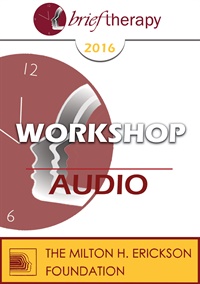
- Average Rating:
- Not yet rated
- Topic Areas:
- Workshops | Brief Therapy | Interviewing
- Categories:
- Brief Therapy Conference | Brief Therapy Conference 2016
- Faculty:
- Wendel Ray, PhD
- Duration:
- 2:53:37
- Format:
- Audio Only
- Original Program Date:
- Dec 11, 2016
- Short Description:
- Conceptually simple, MRI Brief Therapy takes seriously the idea that it is not so much problems in living that bring people into therapy, but ineffective efforts being made to resolve those difficulties that inadvertently exacerbate and perpetuate the problem into irresolvable vicious cycles. Effective brief therapy facilitates clients to Interrupt efforts being made to resolve the problem that inadvertently perpetuate the problem, and in doing so the problem often dissipates on its own.
- Price:
- $15.00 - Base Price
Tags: Brief Therapy Interviewing
- Average Rating:
- Not yet rated
- Topic Areas:
- Workshops | Brief Therapy | Interviewing | Therapist Development
- Categories:
- Brief Therapy Conference | Brief Therapy Conference 2016
- Faculty:
- Michael Yapko, PhD
- Course Levels:
- Master Degree or Higher in Health-Related Field
- Duration:
- 2:37:59
- Format:
- Audio and Video
- Original Program Date:
- Dec 11, 2016
- Short Description:
- In this workshop, we will explore the patterns of thought involved in how people make important life choices, especially those that carry the potential to really make a critical difference in their emotional wellbeing and quality of life. Instead of asking why and then theorizing why someone makes poor choices, our emphasis will be on how one decides to do this, not that, in especially vulnerable situations, i.e., those that hold great potential for causing psychological distress.
- Price:
-
Sale is $29.00
price reduced from Base Price - $59.00
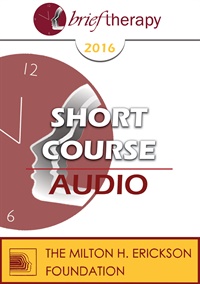
- Average Rating:
- Not yet rated
- Topic Areas:
- Short Courses | Utilization | Interviewing | Ericksonian Hypnosis and Therapy Techniques | Psychotherapy | Hypnosis
- Categories:
- Brief Therapy Conference | Brief Therapy Conference 2016
- Faculty:
- Brent Geary, PhD | Claudia Weinspach, Dipl. Psych
- Duration:
- 1:21:38
- Format:
- Audio Only
- Original Program Date:
- Dec 08, 2016
- Short Description:
- Milton Erickson’s counsel to “Take what the patient brings” encapsulated the utilization approach that he introduced in hypnosis and psychotherapy. This workshop is designed to enhance participants’ awareness of and ability to use the many facets of utilization that are elicited during clinical interviews. Two demonstrations will be included.
- Price:
- $15.00 - Base Price
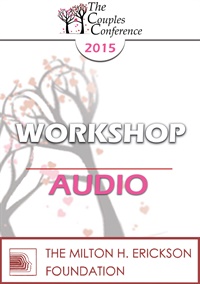
- Average Rating:
- Not yet rated
- Topic Areas:
- Couples Therapy | Workshops | Communication | Interviewing | Therapist Development
- Categories:
- Couples Conference | Couples Conference 2015
- Faculty:
- Peter Pearson, PhD
- Duration:
- 1:53:12
- Format:
- Audio Only
- Original Program Date:
- Apr 26, 2015
- Short Description:
- Conventional approaches begin with: What brings you here? How can I help? What are your objectives? These are great questions for individuals but they are toxic for dysfunctional couples. Their responses will get you a truckload of cross complaints. After ten minutes nobody is feeling great.
- Price:
- $15.00 - Base Price
EP13 Invited Address 17 – Motivational Interviewing and The Language of Change – William Miller, PhD
- Average Rating:
- Not yet rated
- Topic Areas:
- Invited Addresses | Interviewing | Therapist Development | Motivation | Psychotherapy
- Categories:
- Evolution of Psychotherapy | Evolution of Psychotherapy 2013
- Faculty:
- William Miller, PhD
- Course Levels:
- Master Degree or Higher in Health-Related Field
- Duration:
- 53:56
- Format:
- Audio and Video
- Original Program Date:
- Dec 15, 2013
- Short Description:
- Motivational interviewing facilitates a natural process of “talking oneself into change.” Dr. Miller will provide an overview of the clinical method of motivational interviewing and its underlying psycholinguistic processes, based on recent research linking therapist and client in-session speech to behavioral outcomes. These dynamics appear to predict successful outcomes across a variety of psychotherapies.
- Price:
-
Sale is $29.00
price reduced from Base Price - $59.00
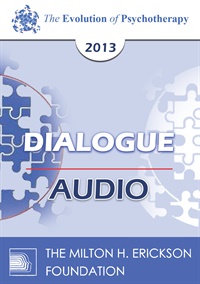
- Average Rating:
- Not yet rated
- Topic Areas:
- Psychotherapy | Dialogues | Acceptance and Commitment Therapy (ACT) | Interviewing | Motivation
- Categories:
- Evolution of Psychotherapy | Evolution of Psychotherapy 2013
- Faculty:
- Steven Hayes, PhD | William Miller, PhD
- Duration:
- 1 Hour 6 Minutes
- Format:
- Audio Only
- Original Program Date:
- Dec 13, 2013
- Short Description:
- EP13 Dialogue 12 – Acceptance & Commitment Therapy and Motivational Interviewing – Steven Hayes, PhD and William Miller, PhD Moderator: Robert Bohanske, PhD Educational Objectives: Given a topic, describe the differing approaches to psychotherapy, and identify the strengths and weaknesses of each approach.
- Price:
- $15.00 - Base Price
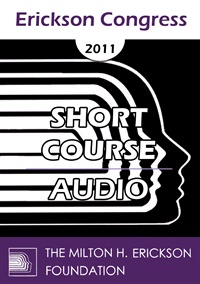
- Average Rating:
- Not yet rated
- Topic Areas:
- Short Courses | Eating Disorders | Ericksonian Hypnosis and Therapy Techniques | Interviewing | Metaphors | Utilization | Weight Loss | Humor
- Categories:
- Erickson Congress | Erickson Congress 2011
- Faculty:
- Stu Belskus, MSW
- Duration:
- 51:09
- Format:
- Audio Only
- Original Program Date:
- Dec 09, 2011
- Short Description:
- This workshop explores Ericksonian approaches to weight loss, including paradox, metaphor, utilization, humor and possibilities. Motivational Interviewing will be utilized. The metaphor of weight loss as a journey is central. Departure, initiation and return are highlighted, noting obstacles and struggles encountered during this exciting adventure! A transformational journey representing a higher level of conscious-ness with increased meaning that makes change possible will be presented.
- Price:
- $15.00 - Base Price
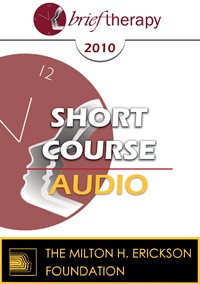
- Average Rating:
- Not yet rated
- Topic Areas:
- Short Courses | Interviewing | Solution Oriented Approach | Brief Therapy
- Categories:
- Brief Therapy Conference | Brief Therapy Conference 2010
- Faculty:
- Lindasue Marshall, LCSW | Ernest Marshall, MSW
- Duration:
- 1:20:51
- Format:
- Audio Only
- Original Program Date:
- Dec 09, 2010
- Short Description:
- This workshop will present a model for using Solution Focused Brief Therapy in group and individual supervision. The presenters will demonstrate how to develop and use a Solution Focused Brief Therapy case presentation outline as an anchor to teach Solution Focused Brief Therapy and help supervisees use the model in their practice. With Ernest Marshall and Lindasue Marshall.
- Price:
- $15.00 - Base Price

- Average Rating:
- Not yet rated
- Topic Areas:
- Clinical Demonstrations | Borderline | Interviewing | Personality Disorders | Psychotherapy
- Categories:
- Evolution of Psychotherapy | Evolution of Psychotherapy 2009
- Faculty:
- Otto Kernberg, MD
- Duration:
- 52 Minutes
- Format:
- Audio Only
- Original Program Date:
- Dec 12, 2009
- Short Description:
- Educational Objectives: Given a patient, give an example of a structural interview. To describe how to test reality testing.
- Price:
- $15.00 - Base Price
- Average Rating:
- Not yet rated
- Topic Areas:
- Clinical Demonstrations | Interviewing | Psychotherapy | Meditation, Spirituality and Yoga
- Categories:
- Evolution of Psychotherapy | Evolution of Psychotherapy 2009
- Faculty:
- James Hillman, PhD
- Course Levels:
- Master Degree or Higher in Health-Related Field
- Duration:
- 52:02
- Format:
- Audio and Video
- Original Program Date:
- Dec 11, 2009
- Short Description:
- EP09 Clinical Demonstration 07 – Case History/Soul History - James Hillman, PhD
- Price:
- $59.00 - Base Price

- Average Rating:
- Not yet rated
- Topic Areas:
- Clinical Demonstrations | Meditation, Spirituality and Yoga | Psychotherapy | Interviewing
- Bundle(s):
- Pioneers of Psychotherapy Bundle
- Categories:
- Pioneers of Psychotherapy | Evolution of Psychotherapy | Evolution of Psychotherapy 2009
- Faculty:
- James Hillman, PhD
- Course Levels:
- Master Degree or Higher in Health-Related Field
- Duration:
- 00:53:00
- Format:
- Audio and Video
- Original Program Date:
- Dec 10, 2009
- Short Description:
- James Hillman (2009) Hillman reveals how to bring “soul talk” back into modern psychotherapy. The case history of a client is the diagnosis, present complaint, family history, employment history, but nothing of the “soul” of the person. Dr. Hillman assures us that we can almost ignore the case history. Using “soul” talk (Longings, dreams, secrets, how a client accepts joy and sorrow) takes the session out of the box and returns a resonance to psychotherapy that it has lost.
- Price:
- $59.00 - Base Price
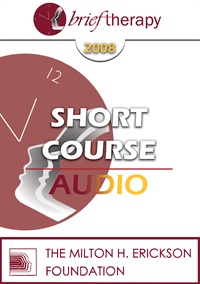
- Average Rating:
- Not yet rated
- Topic Areas:
- Short Courses | Interviewing | Solution Oriented Approach | Brief Therapy | Motivation
- Categories:
- Brief Therapy Conference | Brief Therapy Conference 2008
- Faculty:
- Lindasue Marshall, LCSW | Ernest Marshall, MSW
- Duration:
- 1:29:49
- Format:
- Audio Only
- Original Program Date:
- Dec 11, 2008
- Short Description:
- Interventions often fail because the client is not yet truly motivated for change. Motivational interviewing elicits intrinsic motivation and is highly effective in conjunction with Solution Focused Brief Therapy (SFBT). Participants will recognize language demonstrating readiness for change and learn how to integrate SFBT interventions to bring about lasting change.
- Price:
- $15.00 - Base Price
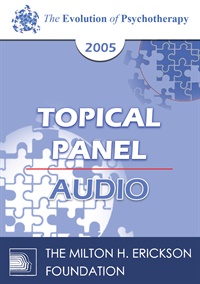
- Average Rating:
- Not yet rated
- Topic Areas:
- Topical Panels | Interviewing | Psychotherapy | Therapist Development
- Categories:
- Evolution of Psychotherapy | Evolution of Psychotherapy 2005
- Faculty:
- David Barlow, PhD | John Gottman, PhD | Julie Gottman, PhD | Bessel van der Kolk, MD
- Duration:
- 1 Hour 1 Minutes
- Format:
- Audio Only
- Original Program Date:
- Dec 09, 2005
- Short Description:
- Topical Panel 02 from the Evolution of Psychotherapy 2005 - The Initial Interview Featuring David Barlow, PhD; John Gottman, PhD; Julie Gottman, PhD; and Bessel van der Kolk, MD Moderated by Stephen Lanktom, MSW
- Price:
- $15.00 - Base Price
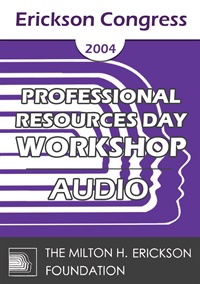
- Average Rating:
- Not yet rated
- Topic Areas:
- Workshops | Interviewing | Therapist Development | Experiential Therapy
- Categories:
- Erickson Congress | Erickson Congress 2004
- Faculty:
- Steve De Shazer, MSSW
- Duration:
- 1:40:27
- Format:
- Audio Only
- Original Program Date:
- Dec 01, 2004
- Short Description:
- This workshop is an experiential session designed to compare and contrast views of self with the view of self as compared by others in a therapeutic interview.
- Price:
- $15.00 - Base Price
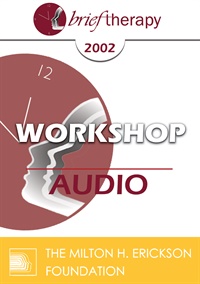
- Average Rating:
- Not yet rated
- Topic Areas:
- Workshops | Interviewing | Brief Therapy | Motivation | Therapeutic Relationship | Therapist Development
- Categories:
- Brief Therapy Conference | Brief Therapy Conference 2002
- Faculty:
- Steve De Shazer, MSSW
- Duration:
- 2:13:08
- Format:
- Audio Only
- Original Program Date:
- Dec 12, 2002
- Short Description:
- Skilled brief therapists just ask miracle questions or scaling questions. They must know how to ask questions in ways that do not undermine client motivation.
- Price:
- $15.00 - Base Price
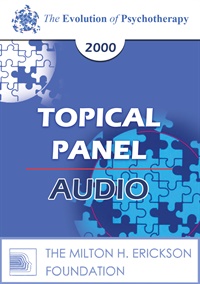
- Average Rating:
- Not yet rated
- Topic Areas:
- Topical Panels | Interviewing | Psychotherapy | Therapist Development
- Categories:
- Evolution of Psychotherapy | Evolution of Psychotherapy 2000
- Faculty:
- William Glasser, MD | Mary Goulding, MSW | Harriet Lerner, PhD | Alexander Lowen, MD
- Duration:
- 53 Minutes
- Format:
- Audio Only
- Original Program Date:
- May 27, 2000
- Short Description:
- Topical Panel 04 from the Evolution of Psychotherapy 2000 - The Initial Interview Featuring William Glasser, MD, Mary Goulding, MSW, Harriet Lerner, PhD, and Alexander Lowen, MD. Moderated by Jon Carlson, Psy.D, Ed.D
- Price:
- $15.00 - Base Price
- Average Rating:
- Not yet rated
- Topic Areas:
- Clinical Demonstrations | Belief Systems | Cognitive Behavior Therapy (CBT) | Interviewing | Psychotherapy
- Categories:
- Evolution of Psychotherapy | Evolution of Psychotherapy 1995
- Faculty:
- Judith Beck, PhD | Aaron Beck, MD
- Course Levels:
- Master Degree or Higher in Health-Related Field
- Duration:
- 58:21
- Format:
- Audio and Video
- Original Program Date:
- Dec 16, 1995
- Short Description:
- Educational Objectives: To describe socratic questioning. To give examples of three negative automatic thoughts. To give examples of three dysfunctional beliefs.
- Price:
- $59.00 - Base Price


